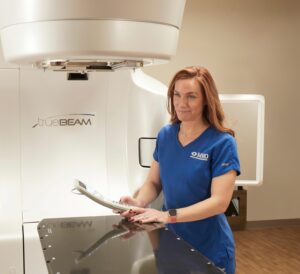Ovarian Cancer Treatment Options
Fighting ovarian cancer with pinpoint accuracy.
Treatment of ovarian cancer usually involves a combination of surgery and chemotherapy. But radiation therapy may be recommended for ovarian cancer in cases where the cancer has spread.
At MRO, there are several different techniques used in ovarian cancer treatment, but each one directs precise doses of radiation at cancer cells, which are more susceptible to radiation than healthy cells. Using state-of-the-art imaging technologies such as MRI, CT, and PET, your MRO care team can pinpoint radiation doses down to the millimeter
When radiation is a treatment option for you, your MRO care team will work closely with your oncology care team to keep you and your family fully informed about ovarian cancer and treatment options.
At MRO, we mainly use two types of radiation to treat ovarian cancer.
External Beam Radiation Therapy (EBRT) is the most common form of ovarian cancer radiation treatment. Using a machine called a linear accelerator (LINAC), MRO radiation oncologists direct high-energy radiation beams to the precise location of the cancer.
Brachytherapy, also known as internal radiation, is also used for ovarian cancer in rare cases. Instead of aiming radiation beams from outside the body, radioactive source(s) are placed inside the body temporarily in or near the cancer.
Once an MRO radiation oncologist has examined you, he or she will discuss treatment options and the pros and cons of radiation treatment for you. Your MRO radiation oncologist will determine the dosage, technique, and type of radiation to be used for your treatment. You’ll also meet with your MRO care team each week to monitor your progress and answer any questions you may have.
Since radiation therapy for ovarian cancer requires the utmost precision, you’ll go through a simulation at the MRO Therapy Center. Using image mapping as a guide, your care team will position you as you would be for treatment and take precise measurements to build a targeted treatment plan and pinpoint the radiation for the best possible outcome.
Although each patient’s journey is different, most women with ovarian cancer receive radiation treatment five days a week, for several weeks. Your own treatment will depend on the type of tumor you have, where it’s located, and what type of technology we’ll be using.
“Radiation oncology is my passion, as is helping others. I have a multi-cultural background and I understand how differently diverse cultural groups approach a cancer diagnosis. My goal is to provide the best, most compassionate care, in a way that’s appropriate to my patients’ needs.”
Raul Fernandez-Gonzalez, MD
MRO | Fairview Ridges